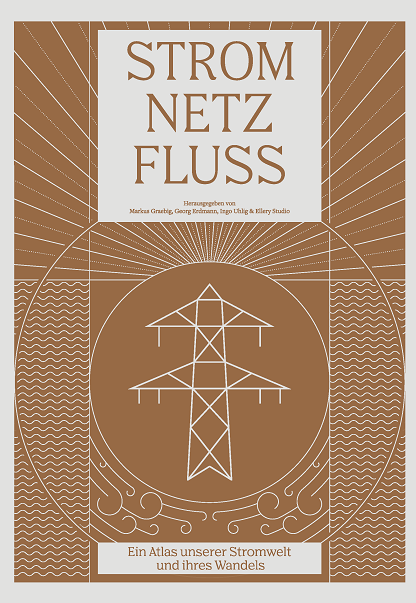Über die Publikationssuche finden Sie Berichte, Studien, Artikel, Bücher, Buchbeiträge und Broschüren, die unter Mitarbeit von Borderstep-Wissenschaftlern und Borderstep-Wissenschaftlerinnen erstellt wurden. Sie können die Texte kostenfrei herunterladen oder erhalten einen Link, wo sie zu erwerben sind. Sie können nach Themen, Autorennamen, Art der Publikationen oder auch über eine Freitextsuche recherchieren.
In der Rubrik Wissen kompakt finden Sie außerdem unser Glossar mit den wichtigsten Begriffen aus dem Forschungsbereich Innovation und Nachhaltigkeit sowie unsere Webinare und Videos, die das Borderstep Wissen in bewegte Bilder übersetzen.
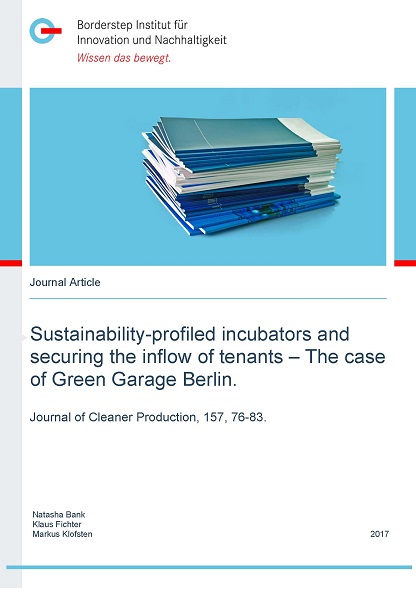
Bank, N., Fichter, K. & Klofsten, M. (2017). Sustainability-profiled incubators and securing the inflow of tenants – The case of Green Garage Berlin. Journal of Cleaner Production, 157, 76-83.
Currently there is an attention in research and practise on entrepreneurial ecosystems, and how these, often using incubators, could support sustainable development through new firm start-ups. Despite the popularity of incubators in the literature and practise, few studies have focused on sustainable incubators in general or, more specifically, on processes that ensure a steady flow of tenants. Thus, this paper investigates how sustainable incubators ensures their inflow of tenants, how they organize their activities and whether the incubator environment affect tenant recruitment.
Ansehen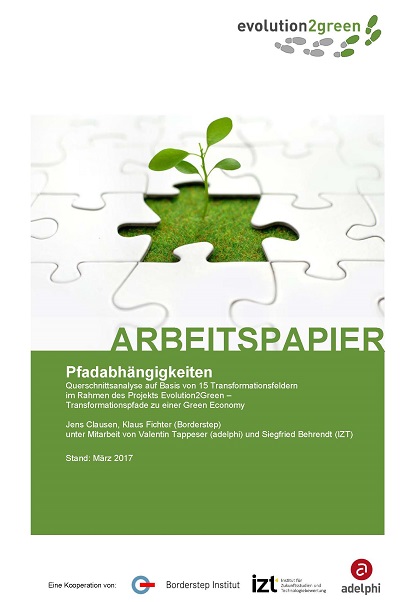
Clausen, J. & Fichter, K. (2017). Pfadabhängigkeiten. Querschnittsanalyse auf Basis von 15 Transformationsfeldern im Rahmen des Projekts Evolution2Green – Transformationspfade zu einer Green Economy. Berlin: Borderstep Institut.
Im Rahmen des Projektes Evolution2Green wurden Pfadabhängigkeiten in 15 Transformationsfeldern untersucht und im Detail beschrieben. Das vorliegende Papier stellt die Querschnittsanalyse zu den 15 Transformationsfeldstudien dar.
Download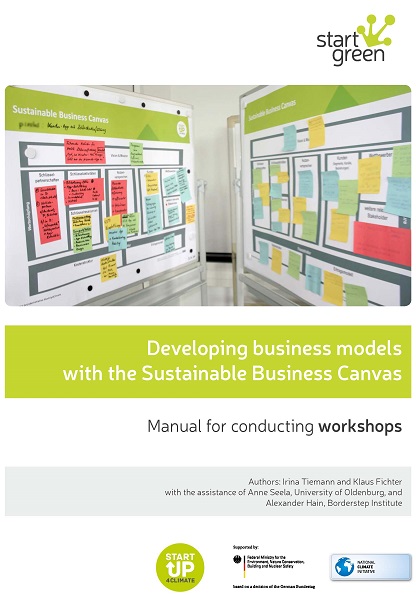
Tiemann, I. & Fichter, K. (2016). Developing business models with the Sustainable Business Canvas: Manual for conducting workshops. Oldenburg, Berlin: Universität Oldenburg.
The Sustainable Business Canvas serves as a foundation for the systematic development of sustainability-oriented business models in the context of an interactive workshop. The present manual provides guidance for conducting such workshops.
Download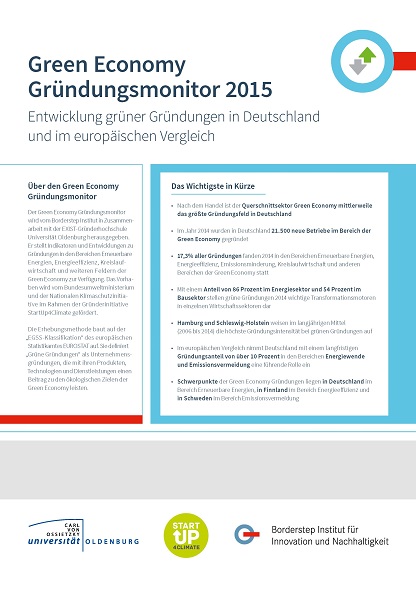
Fichter, K. & Weiß, R. (2016). Green Economy Gründungsmonitor 2015. Berlin, Oldenburg: Borderstep Institut, Universität Oldenburg
Der Green Economy Gründungsmonitor wird vom Borderstep Institut in Zusammenarbeit mit der EXIST-Gründerhochschule Universität Oldenburg herausgegeben. Er stellt Indikatoren und Entwicklungen zu Gründungen in den Bereichen Erneuerbare Energien, Energieeffizienz, Kreislaufwirtschaft und weiteren Feldern der Green Economy zur Verfügung.
Download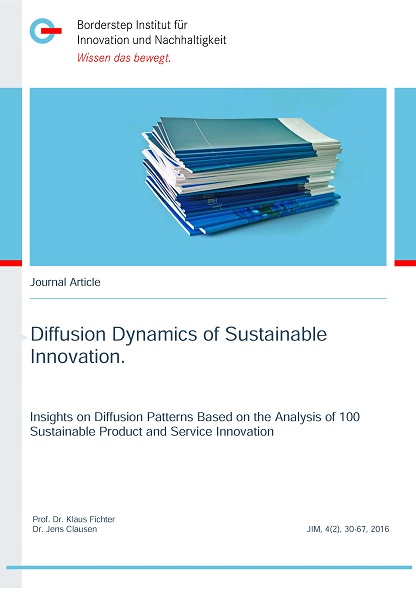
Fichter, K. & Clausen, J. (2016). Diffusion Dynamics of Sustainable Innovation – Insights on Diffusion Patterns Based on the Analysis of 100 Sustainable Product and Service Innovation. Journal of Innovation Management, 4(2), 30-67.
There is a growing consensus about the urgent necessity to green the economy and to decouple economic growth from environmental pressure. Against this background, the article explores three questions: (1) What are key factors influencing diffusion dynamics of sustainable product and service innovations? (2) To what extent do diffusion processes of sustainable product and service innovations differ from each other, and can different groups of diffusion processes be identified? (3) Which factors, actors, and institutional settings are characteristic of different groups of diffusion processes?
Ansehen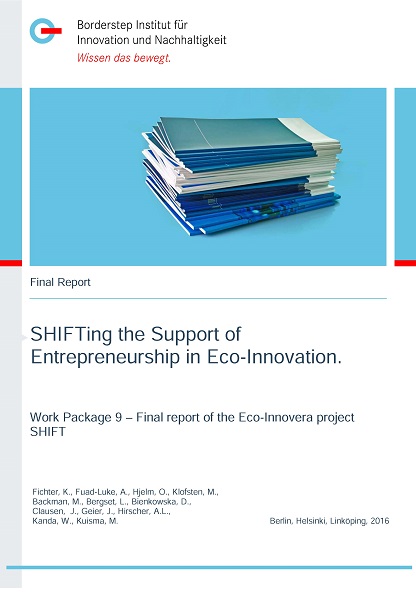
Fichter, K., Fuad‐Luke, A., Hjelm, O., Klofsten, M., Backman, M., Bergset, L., Bienkowska, D., Clausen, J., Geier, J., Hirscher, A.L., Kanda, W., Kuisma, M. (2016). SHIFTing the Support of Entrepreneurship in Eco‐Innovation. Work Package 9 – Final report of the Eco‐Innovera project SHIFT. Berlin, Helsinki, Linköping: SHIFT.
This final report contains key findings and results of the SHIFT project and comprises strategies and recommendations for redesigning support systems for entrepreneurship in order to boost eco‐innovation.
Download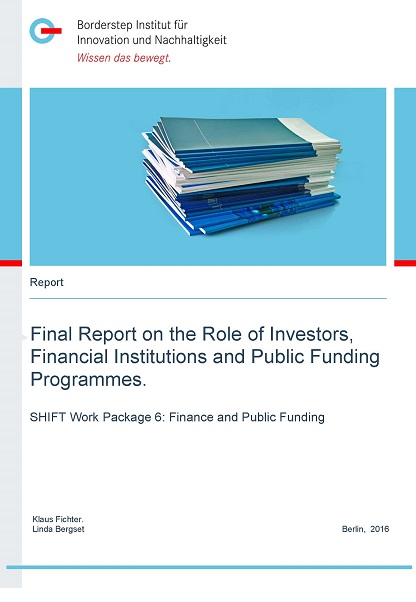
Bergset, L. & Fichter, K. (2016). Final Report on the Role of Investors, Financial Institutions and Public Funding Programmes. Work Package 6. Berlin: SHIFT.
Work Package 6 of the SHIFT project aims at identifying financial instruments, investor types and public funding programmes used by sustainable start-ups and assessing real and perceived gaps in the access to finance and funding at the early stages of companies developing eco-innovation (products and services).
Download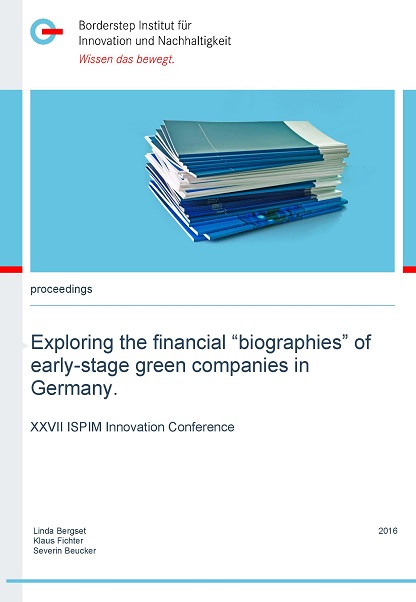
Bergset, L., Fichter, K. & Beucker, S. (2016). Exploring the financial “biographies” of early-stage green companies in Germany. Presented at the XXVII ISPIM Innovation Conference. Blending Tomorrow’s Innovation Vintage. Porto, Portugal.
This empirical study uses a case study design to look at success factors and barriers of financial access in green start-ups in the energy sector in Germany. Although similar success factors and barriers can be found as in other start-ups, some specificity exists for green start-ups in the energy sector
Ansehen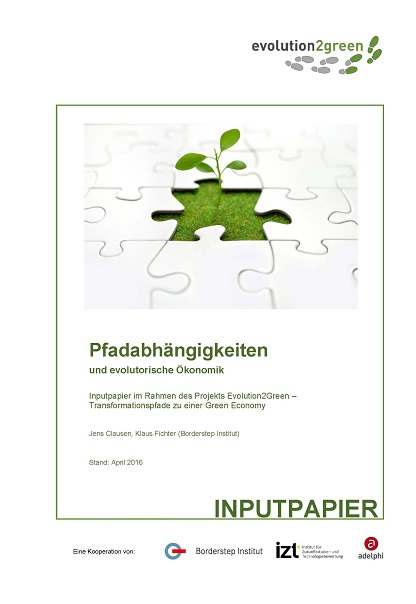
Clausen, J. & Fichter, K. (2016). Pfadabhängigkeiten und evolutorische Ökonomik. Inputpapier im Rahmen des Projekts Evolution2Green. Berlin: Borderstep Institut.
Pfadabhängigkeiten werden in vielen Arbeiten der Innovationsforschung als Erklärung dafür bemüht, warum sich der Wandel vielerorts so schwierig gestaltet. Der vorliegende Text versucht sich in der Aufgabe, auf Basis einer groben Struktur von Pfadabhängigkeiten und mit Blick auf Handlungsfelder der Transformation zur Green Economy einen ersten Überblick über konkrete Erscheinungsformen von Pfadabhängigkeiten zu geben.
Download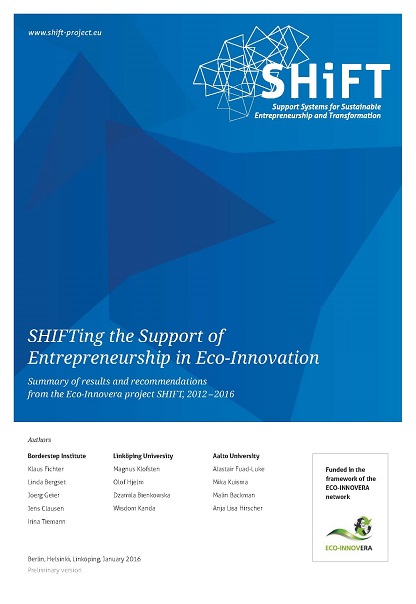
Fichter, K., Fuad-Luke, A., Hjelm, O., Klofsten, M., Backman, M., Bergset, L., Bienkowska, D., Clausen, J., Geier, J., Hirscher, A.L., Kanda, W. & Kuisma, M. (2016). SHIFTing the Support of Entrepreneurship in Eco-Innovation. Summary of results and recommendations from the Eco-Innovera project SHIFT. Berlin, Helsinki, Linköping: SHIFT.
This booklet contains a summary of the scope and research approach adopted, the focal areas of the research, selected key results and subsequent recommendations. More detailed results and recommendations can be obtained from the various reports and publications of the SHIFT project (cf. SHIFT publications).
Download